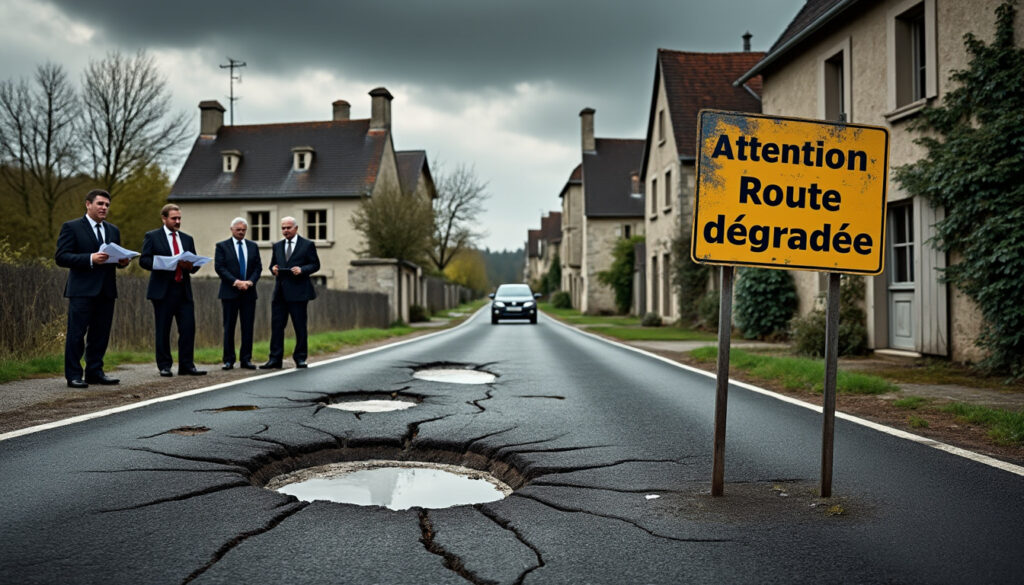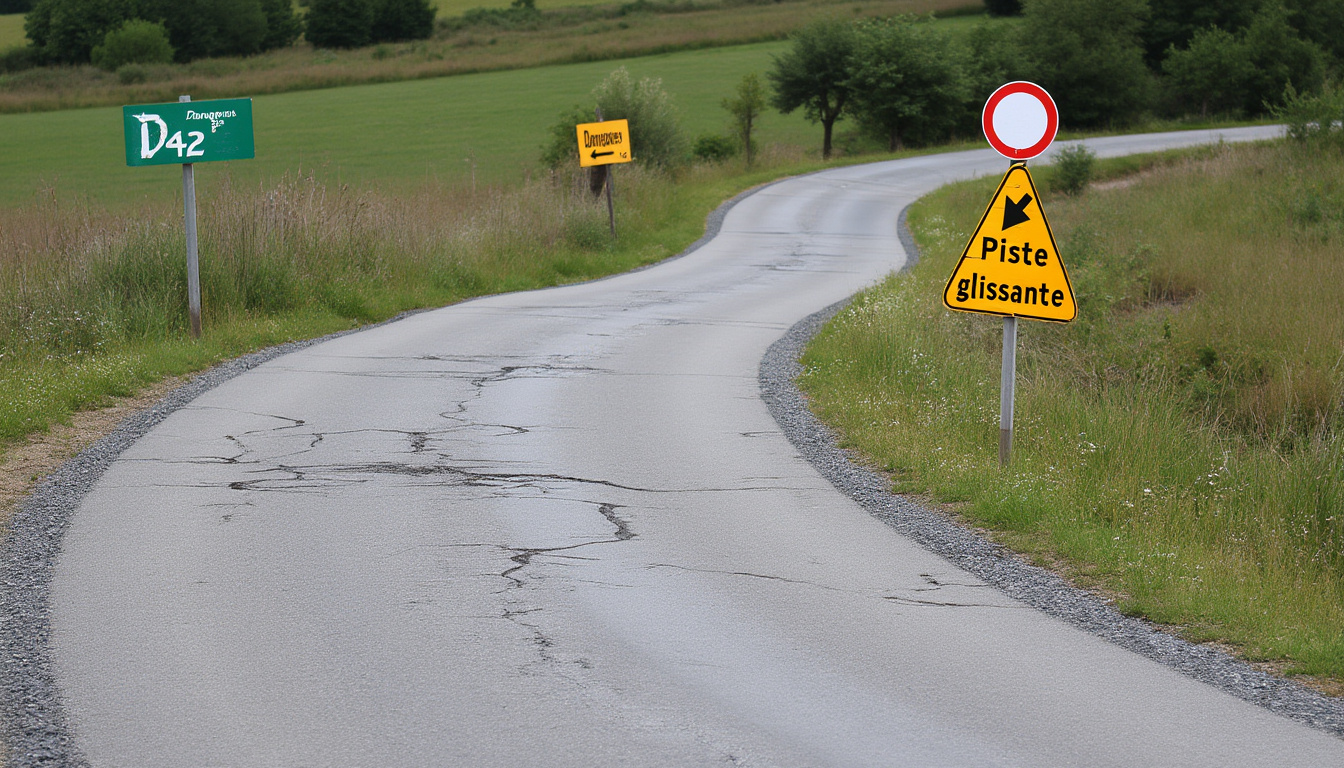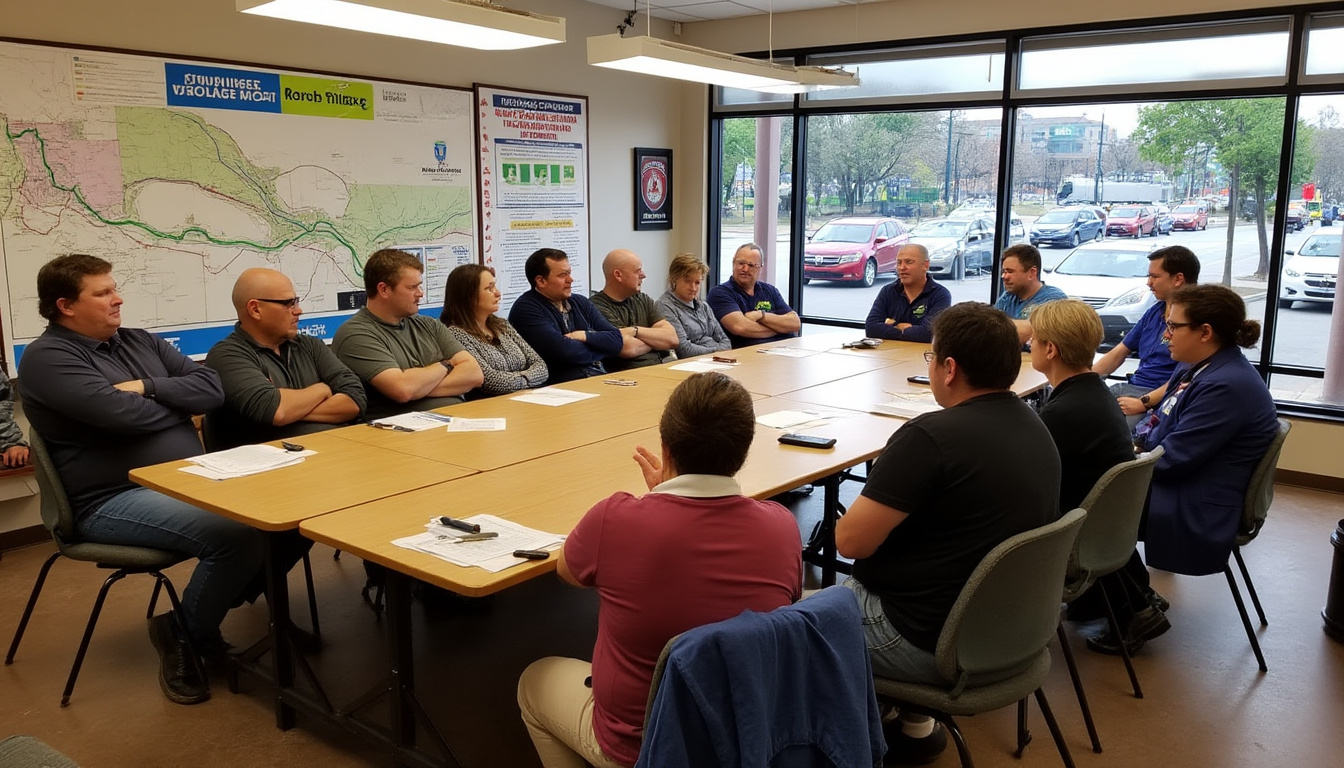L状态的道路状况恶化,法国市长请求国家的支持

Summary: The state of roads in France raises serious concerns among mayors, who are calling for increased support from the State to deal with an alarming deterioration situation. With over 717,000 kilometers of roads under their responsibility, local authorities are highlighting the lack of adequate means for maintenance. This article explores the various issues related to this road crisis, the financial stakes, the consequences for users, and future perspectives.
Mayors alert on the lack of means to maintain French roads
The difficulties faced by mayors in France regarding road maintenance are increasing. Indeed, municipalities, often seen as the pillars of local management, must confront an unprecedented challenge: maintaining a road network of over 717,000 kilometers. This figure is even more significant when compared to the 11,000 kilometers of highways under the State's responsibility. Managing these vast roads incurs costs that are becoming increasingly burdensome for municipalities.
According to the Association of Mayors of France (AMF), a growing number of municipalities are feeling the weight of ineffective road management, marked by a lack of adequate funding. This situation is causing a real uproar among local elected officials, who denounce a glaring discrepancy between the responsibilities devolved and the resources allocated. Indeed, mayors believe that the State is not doing enough to support these efforts. As a result, routes they consider essential for local development and user safety are quickly in jeopardy.
Short-term fixes like pothole repairs or crack sealing are becoming common, but these solutions are only temporary. The expenses incurred by municipalities already amount to 15 billion euros per year, facing rising costs, primarily due to climate change and the natural wear and tear of infrastructure. Disappointed elected officials demand negotiations with the State to secure a better distribution of resources.

The financial stakes and unequal distribution of costs
The issue of road maintenance funding is central to the current debate. Municipalities, responsible for nearly 65% of the French road network, find themselves managing a heritage that is often outdated, with significantly insufficient budgets. The AMF points out that, among the 50 billion euros generated by various road-related revenues (such as fuel taxes and traffic fines), the State only returns about 1 billion euros to municipalities for financing these infrastructures.
This situation causes great frustration among elected officials. Frédéric Cuillerier, co-chairman of the AMF Transport Commission, speaks of a glaring imbalance in the distribution of responsibilities. As a result, the reduction of resources allocated to road maintenance raises obvious questions regarding the State's willingness to fulfill its role as a partner to local authorities. This lack of collaboration can have serious consequences not only in terms of road safety but also in terms of territorial economic development.
Furthermore, the necessity to turn towards viable and sustainable solutions becomes imperative. Networking road maintenance in partnership with major companies such as Colas, Vinci, or Eiffage could prove to be an interesting strategy. These companies, specialized in construction, are often at the forefront of providing the expertise necessary for appropriate maintenance.
| Responsibility for maintenance | Kilometers | Estimated annual budget |
|---|---|---|
| State (Highways) | 11,000 km | Undetermined |
| Local authorities | 717,000 km | 15 billion € |
Municipal roads in poor condition, with few means to maintain them
The observation is unequivocal: many municipal roads are in deplorable condition. Municipalities must juggle urgent repairs and the lack of sustainable funding. The state of the roads is deteriorating strikingly, raising real concerns about the safety of users, notably the most vulnerable, such as motorcyclists. Indeed, every day, they face dangers such as potholes, ruts, and cracked roadways.
The AMF report highlighted the necessity to address what they call the territorial fracture, as access to quality infrastructure is not uniform across the entire territory. Rural communities, often less populated, suffer the most due to longer response times for their maintenance projects. Mayors are sounding the alarm to raise awareness among authorities about the crucial issues related to the condition of road infrastructures.
The consequences of deteriorated infrastructure for users
The deteriorated state of roads has direct repercussions on road safety. Thousands of traffic accident cases can be attributed to poor road conditions. That said, the costs incurred by these accidents are not limited to human losses. They also include repairs to infrastructure, increases in insurance premiums, and the loss of value of real estate properties located near poorly maintained roads.
To combat this scourge, some municipalities are beginning to envision alternative solutions, such as access to European funds or the implementation of public-private partnerships with prestigious firms. Companies like Société Alpine d'Entreprises, Onyx, or various Road Operating Companies could undertake innovative road maintenance initiatives, such as using sustainable materials or advanced technologies.
- Direct impact on user safety
- Deterioration of local quality of life
- Economic costs related to maintenance and accidents
- Increased risk of social fractures between urban and rural areas
The views of local stakeholders: a request for support from the State
Mayors continue to make their voices heard to demand support from the State. Their concerns are shared by road users, who are confronted every day with the dangers of a deteriorating road network. During various conferences, notably one held in Marseille last May, the AMF made its points clear. Mayors are calling for suitable financial tools capable of responding in real time to urgent road maintenance needs.
Concrete proposals from elected officials
Local elected officials are making several requests to the State for it to take responsibility for road maintenance. Among the most frequently mentioned proposals are:
- A *fair funding* of the road network with a return of resources collected by the State.
- The establishment of a *national support fund* specifically dedicated to the maintenance of road infrastructures.
- Measures for *awareness-raising* to alert citizens about the importance of maintaining roads in good condition.
- The possibility to *delegate certain maintenance responsibilities* to private partners, allowing for more effective management.
These proposals highlight the economic and social realities that local authorities face. In this debate, transparency regarding the use of allocated funds becomes crucial so that every citizen can understand how their money is invested for collective safety and well-being.

| Proposals from elected officials | Expected impact |
|---|---|
| Fair funding | Simplify access to resources for maintenance |
| National support fund | Guarantee preventive maintenance of infrastructures |
| Civic awareness | Encourage citizen engagement for their safety |
| Delegation to private partners | Optimize management of road infrastructures |
Future perspectives and the role of companies in road maintenance
The challenges related to the state of roads in France are enormous. However, future perspectives are emerging with the engagement of several companies. Companies such as Eurovia and Bouygues have started to explore ways to improve and optimize road maintenance techniques. With the advent of new technologies, especially in the field of sustainable materials and eco-responsible practices, it is conceivable that true revolutions may occur in infrastructure maintenance.
Public-private partnerships: a solution to consider
In the face of the scale of the challenge, public-private partnerships appear as an appropriate response. By relying on the expertise of companies like the South of France Motorway Company, local authorities could benefit from efficiency gains and innovations in road management.
An interesting example is where local authorities could propose calls for tender for maintenance services based on criteria of sustainability and innovation. This model could generate profitable collaborations between the public and private sectors, leading to roads in much better condition while contributing to ecological transition.
- Adoption of advanced technologies
- Collaboration with construction experts
- Access to best practices in road management
- Reinforcement of local infrastructures
| Potential partners | Resources used |
|---|---|
| Colas | Expertise in road construction and repair |
| Vinci | Infrastructure and technological innovation |
| Eiffage | Sustainable and ecological practices |
| Grouping of Road Craftsmen | Local resources and know-how |
Source: www.caradisiac.com
Leave a Reply


Articles relatifs